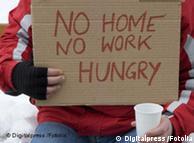06.10.2011
When UK police raided a travellers' site about 50km (31 miles) north of London last month, they removed 24 people who had allegedly been living as modern-day slaves, some for up to 15 years. Investigators say many of the men were homeless or alcoholics.
Six men and a woman, all from the same extended family, have been charged with slavery offences.
While not referring to this case specifically, homeless organizations Thames Reach and St. Mungos have revealed that they are aware of an increasing number of homeless people, sleeping rough in and around UK cities, that have been approached with offers of work and shelter.
Targeting the homeless
The targets are mostly men, often from eastern Europe, the Middle East and west Africa. The victims are befriended by gangs from similar backgrounds at soup kitchens, or outside night shelters and job centers.
''The people who are approached are generally those who have no family connections, little to live for," said Adam Rees, Head of Street and Community Outreach for St. Mungos homeless charity.
 Homeless people are vulnerable to criminals
Homeless people are vulnerable to criminals
"They've lost work, people who are alcohol dependent, people who are mentally unwell."
''It's appealing for someone to come up and say, 'let's go, I can offer you a job, I can offer you accommodation'." Rees said, who has spoken to some of the victims after they return to living rough in London.Homeless campaigners say it can be an opportunity to escape from sleeping rough where their ''bosses" turn a blind eye to their alcohol or drug abuse and can even feed it. One man described being paid in booze.
Victims are threatened
Many of the men reportedly told another charity how they'd been intimidated or beaten, had their wages withheld and how their accommodation was often cramped and filthy. In one case, some victims were allegedly kept in kennels.
''The people that come back to us tell us that they were held against their will," Rees said.
''They were threatened with violence if they left, they were threatened that people knew their families and would be able to get to them," he added.
Much of the work for these men materializes on construction sites, road-building projects or on farms – activities that need a constant supply of cheap workers willing to do hard labor. These industries are well-known for offering 'cash' payment, sometimes at less than the legal minimum wage.
 The number of homeless becoming victims of exploitation is on the rise
The number of homeless becoming victims of exploitation is on the rise
The charities say they've since been able to help several of the men who managed to escape from their gang-masters.
Victims not all foreign
When the raid on the Greenacres travellers' site in Bedfordshire took place, the UK media reacted with shock to the revelations that among the 24 alleged slavery victims, 15 of them were thought to be British.
While the UK is known as a major destination for people trafficking from abroad, the general consensus was that slavery was generally limited to immigrants.
The raid has led some officials to question how UK-born citizens, who have access to welfare and other social support can find themselves in such desperate circumstances.
''It's not something new or unusual but still in the public perception it seems quite uncommon," said Klara Skrivankova from Anti-Slavery International, who thinks that UK officials are partly to blame for the misconception.
''The government doesn't seem to want to pay attention to the fact that nationals of their own country can become victims of trafficking," she added, pointing to the fact that ministers are more interested in highlighting international rather than internal cases.
''People who may be particularly vulnerable because of their age, social situation or poverty can easily become victims of forced labor within the UK," Skrivankova said.
EU crackdown
Britain is not alone in seeing increased reports of modern slavery. Just last month, French newspapers lamented the cruel treatment of temporary workers responsible for the harvesting of Champagne grapes.
In the Netherlands, a farmer stands accused of human trafficking and labor exploitation after workers alleged they had their passports confiscated, were refused permission to leave and were paid far below the minimum wage.
EU ministers issued a new directive earlier this year calling on all countries to do more to prevent and combat human trafficking. Figures suggest that more than 14,000 victims were uncovered in EU countries during 2009.
New British law
Last year, Britain enacted the new Slavery and Servitude Act to give police additional powers to prosecute those suspected of enforced labor. In theory, prison sentences were toughened. But campaigners say that in practice, not enough has changed.
Sexual exploitation is a major part of people trafficking
''Most of the sentences either for forced labor or trafficking are no more than two years. Some sentences are suspended, some tend to be around six months," Skrivankova said, pointing out that perpetrators can face up to 14 years in jail under the new law.
''That's something we've been highlighting that actually the Crown Prosecution Service should either appeal against sentences or try to issue further guidance in terms of what should be appropriate sentences for trafficking and slavery," she added.
While these reports show an increase in men becoming victims to incidences of forced labor, recent UK figures suggest that sexual exploitation is still the major factor in half of suspected trafficking cases. Women made up more than three quarters of victims.
Author: Nik Martin (ar)
Editor: Stuart Tiffen




No comments:
Post a Comment